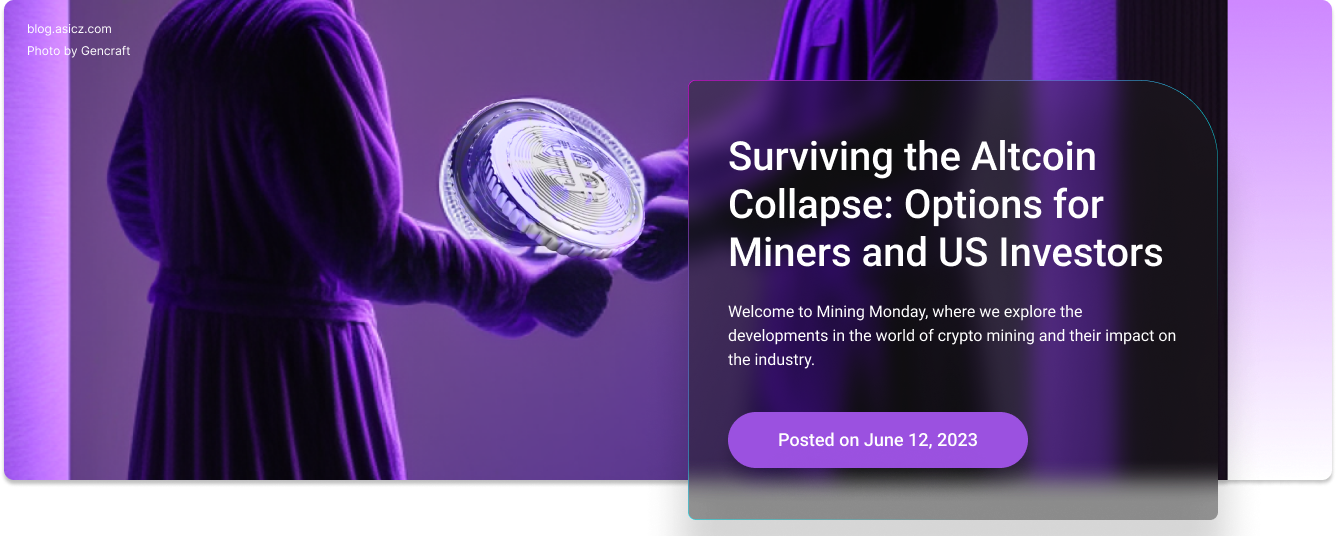Welcome to Mining Monday, where we explore the developments in the world of crypto mining and their impact on the industry. The crypto market has been rocked by recent events, including the SEC’s statements deeming many cryptocurrencies as securities, leading to exchanges like Robinhood delisting several cryptocurrencies and Binance updating its Terms of Service. The recent altcoin collapse triggered by Scimitar Capital’s sale of $2B worth of altcoins late Friday has further shaken investor confidence. In this article, we’ll explore the options left for US investors to invest in crypto and how miners can sell their mining rewards into fiat amidst regulatory uncertainty.
Crypto Delistings and Binance’s Updated Terms of Service
Following the SEC’s statements deeming many cryptocurrencies as securities, major US platforms like Robinhood have taken steps to delist Cardano, Polygon and Solana tokens. Binance, on the other hand, has not delisted any tokens yet but has updated its Terms of Service to state that it might “in its discretion convert such Digital Assets [that it’s delisted] to a different type of Digital Asset.” This has left investors fearful that Binance may convert delisted tokens to BNB without notice.
The Altcoin Collapse
The recent sale of $2B worth of altcoins by Scimitar Capital late Friday led to a significant collapse in the altcoin market. This event has further shaken investor confidence and has raised questions about the stability of the crypto market in the face of regulatory uncertainty.
For instance, the Scimitar Capital sale led to a sharp decline in the prices of several altcoins, such as Chainlink (LINK) and Cardano (ADA), causing panic selling and further exacerbating the market downturn.
Options for Miners and US investors
Despite the challenges posed by the SEC’s statements and the subsequent delistings, miners that need to sell rewards to pay power bills and US investors still have some options. Some of these include:
- Decentralized exchanges (DEXs): US investors can turn to decentralized exchanges, which operate without a central authority and allow users to trade cryptocurrencies directly with one another. For example, Uniswap and SushiSwap are popular DEXs that offer a wide range of trading pairs, including those involving delisted tokens.
- Over-the-counter (OTC) trading: Investors can also explore OTC trading, which involves buying and selling cryptocurrencies directly between parties without going through an exchange. For instance, platforms like Circle Trade and Genesis Trading facilitate OTC transactions for institutional and high-net-worth individuals.
- Peer-to-peer (P2P) platforms: Another option for US investors is to use P2P platforms, such as LocalBitcoins, which connect buyers and sellers directly, allowing them to trade cryptocurrencies without the need for an intermediary.
- Mining pools and platforms: Miners can join mining pools or platforms that offer services for converting mining rewards into fiat. For example, platforms like NiceHash and MiningPoolHub allow miners to mine various cryptocurrencies and automatically convert their rewards into a more stable currency, such as Bitcoin or a stablecoin.
- Stablecoins: US investors and miners can also consider using stablecoins, which are cryptocurrencies pegged to a stable asset like the US dollar. Tether (USDT) and USD Coin (USDC) are popular stablecoins that can provide a more stable store of value and a way to hedge against the volatility of the crypto market.
The recent SEC statements and the subsequent delistings of tokens, along with Binance’s updated Terms of Service, have undoubtedly shaken the crypto industry. However, US investors and miners still have options for investing in crypto and converting their mining rewards into fiat. By exploring alternatives like decentralized exchanges, OTC trading, P2P platforms, mining pools, and stablecoins, they can continue to participate in the crypto market despite the regulatory challenges.
As the industry continues to evolve, it will be crucial for regulators, businesses, and investors to work together to establish clear guidelines and best practices that promote innovation while protecting consumers and maintaining market stability.
In the midst of all this uncertainty, AsicZ stands as a dependable source for a vast selection of volume mining equipment and MaaS (mining as a service) solutions. We are committed to providing our customers with the tools and resources they need to take advantage of the opportunities presented by the rapidly evolving crypto industry. Check out AsicZ’s blog to stay tuned for more exciting news from the world of crypto, and don’t forget to visit AsicZ.com for everything ASIC from A-Z.

